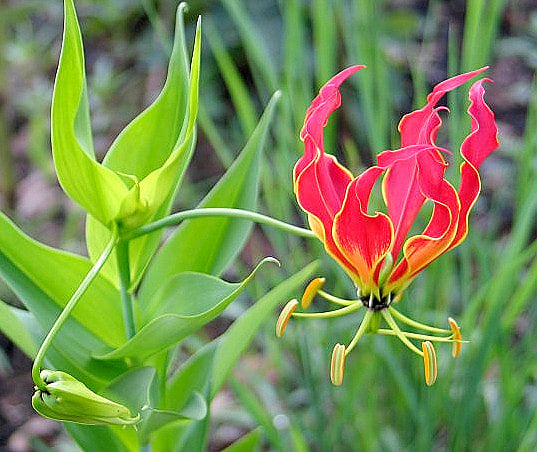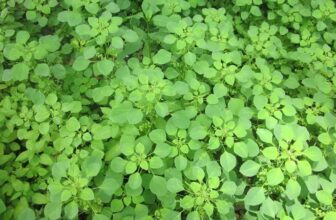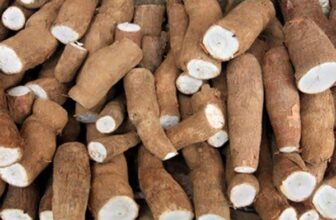
Nature has always been a generous healer. Our ancestors discovered the medicinal value of plants long before modern pharmaceuticals. One such miraculous yet misunderstood flower is Senganthal Poo, also known as Glory Lily, Flame Lily, or scientifically as Gloriosa Superba. In Tamil culture, this flower is especially significant and traditionally blooms during the month of Karthigai, earning it the name Karthigai Malar.
Senganthal Poo – A Gift of the Seasons
The Senganthal flower grows predominantly during the Karthigai Tamil month, aligning with the belief that each plant has its own season, tied to the rhythms of nature. The bright yellow and red flame-like petals give the flower a striking appearance, resembling burning firewood – hence its English name, Flame Lily.
This flower is native to Marudham and Neidhal regions and is considered sacred to Lord Murugan, further enhancing its cultural and spiritual significance in Tamil Nadu.
National Symbol Turned Export Commodity
Interestingly, the Senganthal flower was once the national flower of Sri Lanka. However, in recent times, the flower has gained popularity in foreign pharmaceutical industries, particularly for its use in cancer treatments. What’s ironic and unfortunate is that this plant, found abundantly in our land, is exported for medicinal use abroad and re-imported at high cost in the form of modern medicine.
Toxicity and Precaution
While Senganthal Poo holds great medicinal value, it must be handled with care. The root tuber of the plant is highly poisonous and should never be consumed internally. This toxic nature of the plant has contributed to its misunderstood status, but proper preparation transforms its properties into powerful external medicine.
External Uses and Preparation
Treatment for Skin Problems
The leaves of the Senganthal plant can be mixed with mahua oil (Ilupai Ennai) and used to treat various skin rashes and related conditions. This blend acts as a traditional topical treatment, passed down through generations.
Solar Infused Medicine for Leukemia
A fascinating method mentioned in the video involves a solar water extraction process:
Boil Senganthal flower petals in distilled water.
Filter the water into a glass bottle.
Add the same petals again to the filtered water.
Keep the sealed bottle under sunlight for 7 days.
This sun infusion process allows alkaloids from the petals to be released into the water. The resulting solution can be used to gently wipe the skin. It is believed to aid in treating leukemia and also stimulates melanin production, promoting natural skin healing and protection.
Spiritual and Environmental Significance
Gnana Sundarapandiyan highlights that nature does not grow any plant without purpose. Every plant is linked to the seasonal cycle of diseases and environmental changes. The flowers and herbs that bloom in each Tamil month are designed to balance the ailments typically seen during that time.
Senganthal Poo is not just a medicinal flower but also a spiritual and ecological marker of health. Its bloom in Karthigai is symbolic of the fire within nature and the transformative power of sunlight and seasonal energy.
Key Takeaways
- Senganthal Poo (Gloriosa Superba) is a medicinal and culturally significant flower that blooms in the Karthigai Tamil month.
- Its roots are poisonous and should not be consumed, but its leaves and petals have valuable external medicinal applications.
- A sun-infusion method involving petals and distilled water is used to create a remedy for leukemia and melanin production.
- The flower has been commercially exploited, exported for cancer medicine production, and re-imported to India at high cost.
- The leaves mixed with mahua oil serve as a natural treatment for skin rashes.
- The flower is favoured by Lord Murugan and grows in Marudham and Neidhal lands, showing its deep roots in Tamil heritage.
- Recognizing the value of seasonal plants is essential to preserving natural healing and reconnecting with ancestral wisdom.
Senganthal Poo stands as a burning symbol of lost knowledge and untapped potential. As Gnana Sundarapandiyan emphasizes, reclaiming the medicinal and cultural significance of our native plants is not just a matter of heritage but of health sovereignty. By learning how to grow, prepare, and use such seasonal flora, we protect not only our bodies but also our environment and spiritual legacy.
Let us nurture and preserve these gifts of nature, rather than letting them vanish or be exploited by others.





